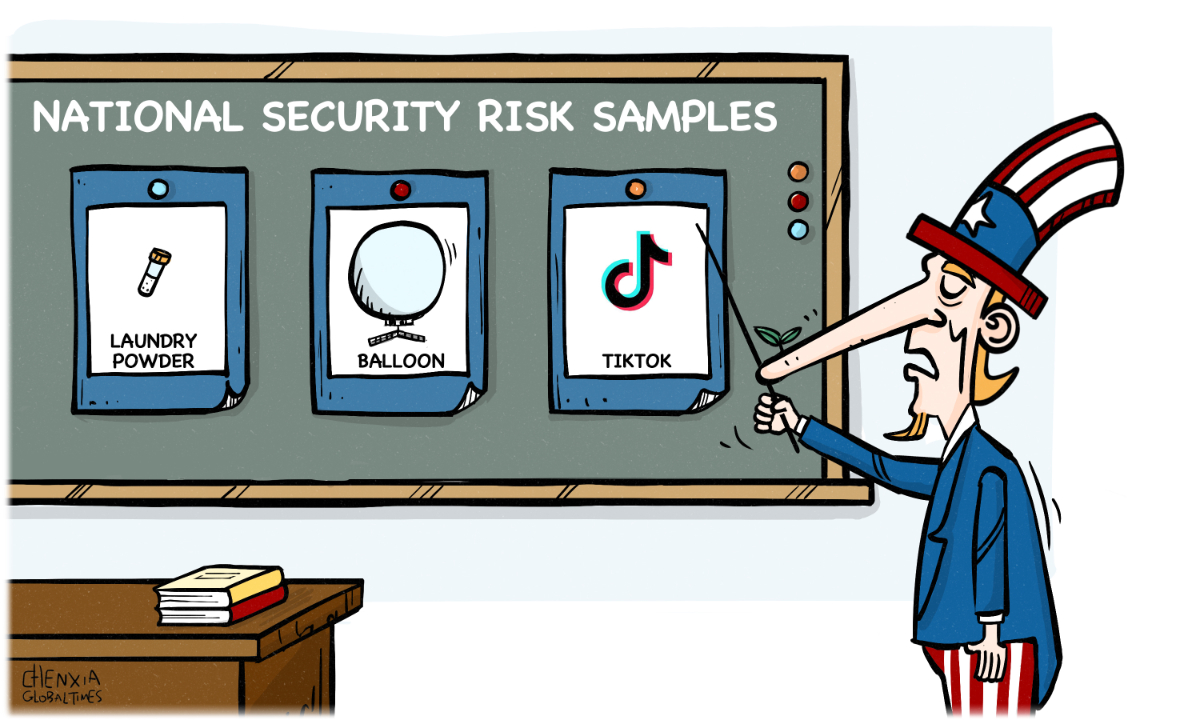
US fabricates national security lies for its own political gains. Cartoon: Chen Xia/GT
Top intelligence leaders of the US said on Wednesday that China remained the "most consequential threat" to its national security, in another attempt to hype the "China threat" narrative that has worsened bilateral ties in many ways in the past year. As the narrative increasingly becomes one without a bottom line, experts warned that the US will pay a heavy price for mending ties.
Testifying before the Senate Intelligence Committee as part of the panel's annual hearing, Director of National Intelligence Avril Haines said the Communist Party of China (CPC) "represents both the leading and most consequential threat to US national security and leadership globally, and its intelligence-specific ambitions and capabilities make it for us our most serious and consequential intelligence rival."
The hearing also covered the annual threat assessment report, a major yearly public release by US intelligence agencies on a variety of issues that they regard as "national security challenges."
While some parts remain basically unchanged from year to year, the section on China has greatly expanded this time, reflecting the greater focus that intelligence agencies have put on China under the Biden administration, US media reports said.
Chinese experts, though, were not surprised about this "special attention."
Li Haidong, a professor at the China Foreign Affairs University, told the Global Times on Thursday that in the past year, Washington's hyping of the "China threat" narrative has increasingly become one that knows no bottom line.
In the past year, as the US picked up anti-China rhetoric repeatedly, China fought back by taking countermeasures, which were then met with the US wielding more force to suppress China. This resulted in a spiral of escalating tensions that worsened bilateral ties in multiple ways, Lü Xiang, research fellow at the Chinese Academy of Social Sciences, told the Global Times.
Contrary to what US President Joe Biden said, that he doesn't seek confrontation, his administration created more tension, forming confrontations with China from all aspects in the past year, when the pair could have more chances to become mutually beneficial partners, Lü said.
At a press conference on the sidelines of the first session of the 14th National People's Congress,
Chinese Foreign Minister Qin Gang said on Tuesday that common interests, shared responsibilities and friendship between peoples should determine the China-US relationship, rather than US domestic politics or hysterical neo-McCarthyism.
"We hope the US government will listen to the calls of the two peoples, get rid of its strategic anxiety of 'threat inflation,' abandon the zero-sum Cold War mentality, and refuse to be hijacked by 'political correctness'," he said.
The narrative of "systemic challenge," first used to describe China by NATO in June 2022, became more evident in Wednesday's report, which said Beijing is "increasingly challenging the US economically, technologically, politically and militarily around the world," and "increasingly convinced it can only make itself the pre-eminent power in Asia, and a major power globally, by diminishing American influence," the New York Times reported.
Another change in this year's report is that the US is trying harder to sell its China "threat theory" to the international community, Li said. "Seeing there are still many countries friendly to China, the Biden administration is trying hard to distort China's image on the global stage to a state where all parties feel threatened, in a bid to have China pinned down in handling international affairs."
Lü noted that a stronger tone against the CPC was observed in the report, which risks pushing the relationship to the edge of a cold war mode.
The newly released report conveyed a harsher and more proactive tone on the Taiwan question and also singled out China's growing influence in the technology sector.
Observers warned that spending large chunks of the report on China also catered to the unfriendly atmosphere in the US, and could be paving the way for a more hostile and destructive China policy.
"The worse the US messes up bilateral ties, the more effort it will require to handle and fix them. It will be a heavy price for the US to pay," Lü said.




